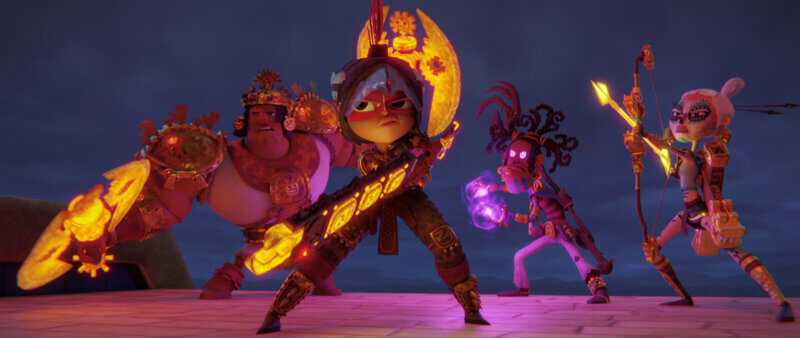Autism Awareness Month: Interview with Jorge R. Gutiérrez
Last year on Skwigly, we were fortunate to have writers, animators, and filmmakers join us to celebrate Autism Awareness Month and talk about their projects and experience associated with both animation and the autism community.
One of the people who have joined us for this year’s celebration is Jorge R. Gutiérrez, who is best known for his work as director and writer on the 2014 film The Book of Life and Netflix’s 2021 mini-series Maya and the Three. But he is also an autistic animator who has worked in the industry for many years and currently collaborates with Netflix.
How did your autistic journey start in life? I understand that you were not diagnosed until you were an adult…
My son was diagnosed autistic when he was about to turn 3 years old. After he was diagnosed my parents said I was exactly like him at that age. So at 40 years old while we lived in Dallas, Texas, I contacted a specialist and was professionally diagnosed as “Twice-Exceptional with ASD”. It explained a million things from my past and frankly has made me more aware of my strengths thanks to ASD.
Looking back at your previous work now, did you recognize any autistic behaviors in the approach to your work?
Absolutely! I’m hyper emotionally sensitive and find myself studying the lives of others around me constantly which has obviously informed and inspired all my art and stories in animation. I can remember things very clearly and emotionally so this has been a kind of superpower for me as a filmmaker. I’m very methodical but at the same time, I try to constantly change things up to keep myself interested. I can easily hyperfocus and work for 4 to 6-hour chunks uninterrupted. Creative multitasking also comes naturally and this allows me to work on multiple short and long overlapping projects at once. I can also turn off my emotions when my work is not well received which comes in very handy in my profession.
Since discovering you are autistic, how have you personally felt the disability reflected on your work, especially with your more recent titles like Maya and the Three and your collaboration with Netflix?
As an autistic creator/writer/director it’s impossible for my work to not have that reflected. Any character that is based on me in any of my work is naturally autistic. Netflix has been incredibly encouraging when it comes to neurodiverse representation and I could not be more thankful. Characters like Rico and Chimi (in Maya and the Three) represent people that are born “different” and don’t allow that difference to define them. That’s me with autism.

MAYA AND THE THREE (L to R) GABRIEL IGLESIAS as PICCHU, ZOE SALDAÑA as PRINCESS MAYA, ALLEN MALDONADO as RICO and STEPHANIE BEATRIZ as CHIMI in MAYA AND THE THREE Cr. NETFLIX © 2021
As someone who has directed large teams of people and collaborated with different studios, can you explain to any aspiring autistic filmmakers (or parents with autistic children) what it’s like?
I’m going to guess that maybe 1/3 of all the film directors and show creators I have met in animation are more than likely autistic and they just have never been diagnosed or rather not discussed it publicly. This is an industry that is very welcoming to people on the autism spectrum.
What has been the reaction of the autistic community, since you opened up about being autistic yourself?
It’s been really great and heartfelt! As an autistic father with an autistic son, I have felt very welcomed into this worldwide community. Everyone’s experiences are completely different but we can all agree that autism acceptance is our communal goal.
For those of us on the spectrum who are trying to break into animation, what advice would you give them?
With or without being on the spectrum, animation is an incredibly competitive industry. But there are thousands of us making a living from it. My advice would be to figure out how to use your autism to develop your skills and post your art and start making shorts. The only way to become a creator or director is to make things. It’s how everyone, autistic or not, gets started. If I could do it, anyone else can do it!

